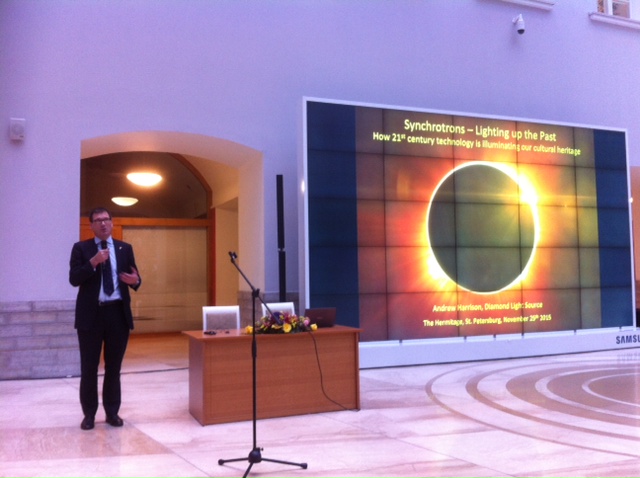20th January 2016 Moscow, Russia
Of Science and Synchrotrons

In late November SIN Russia delivered – an extremely successful follow-up to our February 2015 Novosibirsk UK-Russia science cafe on the next generation synchrotron light sources. We teamed-up with the world famous Hermitage Museum in St Petersburg, and the UK’s national synchrotron science facility, Diamond Light Source (DLS), to deliver a talk on synchrotrons in heritage preservation by Professor Andrew Harrison, CEO of Diamond.
As you would expect in one of the worlds cultural centres St. Petersburg has a rich art expert community and with restoration and conservation at the heart of the Hermitage’s work the venue was fitting for a talk on how science helps to pressure art and history. It was a most timely arrangement too, coinciding with the 2015 International Year of Light and Light-based technologies, for which Russia is one of the five sponsoring countries.
The event went down a storm. It showcased both the UK’s research infrastructure capabilities and enlightened the audience on the multiple ways in which science facilities can help solve the most pressing conservation issues from Henry VIII flagship Mary Rose to Turner’s watercolours. It also helped stress UK/Russian science links and illuminated the long-standing bilateral cooperation in the field of accelerator science.
Diamond is well-known to the Russian science community. It has long-standing links with Russia’s two largest research facilities – the Kurchatov Institute in Moscow and Budker Institute in Novosibirsk. Andrew Harrison is also a member Kurchatov’s International Science Policy Committee that provides advice about large-scale projects for ‘mega-science’ facilities in Russia. Out of all the breadth of science, physics and maths in Russia accelerator science has featured prominently and still does. As Professor Harrison said in his talk – much of the pioneering work in the theory of synchrotron radiation was carried out in the Soviet Union in the 1940s by two Russian scientists Dmitry Ivanenko and Isaac Pomeranchuk. The research excellence of Ivanenko and Pomeranchuk is still very much alive and many Russian scientists play a prominent role in European research facilities like CERN in Geneva and the ESRF in Grenoble. Budker is also an important source of beamline magnets for major synchrotron and accelerator facilities and recently saw their draft design for CERN’s prospective Second Large Hadron Collider chosen over others as it reportedly allows increasing the performance of the collider hundredfold.
Over recent years Russia’s accelerator science has been plagued with insufficient funding that does not match the existing expertise. Thankfully help is at hand. In September 2015 the EU launched the CREMLIN project to link up EU and Russian large scale research centres and encourage European scientists to get involved in new projects involving Russian research centres. Budker also has its eyes set on a prospective multinational linear collider project likely to be built in Japan.

With all this in mind, there is clearly scope for more bilateral work in the field of accelerators, notably in developing next generation compact synchrotron light sources that could revolutionize a raft of strands, especially in healthcare and science. Our events in Novosibirsk and St. Petersburg prompted some very interesting discussions and British and Russian accelerator experts are working on a follow-up workshop in the near future.